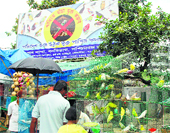 |
| Indian and foreign birds being sold at the Galiff Street market. Picture by Bishwarup Dutta |
On any given Sunday, the quiet Galiff Street, off Bagbazar, comes alive with twitterings and chirps. Rows of cages containing plumed pets of various shades, both desi and foreign, are lined up on either side of the road.
At one place, a huge billboard pleads with people to free caged birds. But no one pays any attention to it.
Though the Indian Wildlife Protection Act 1972 bans the capture and trading of 1,200 types of indigenous birds, the Galiff Street market flouts most rules in the book, trading in almost all kinds of desi varieties in broad daylight.
Alongside exotic foreign breeds, like the rosella and Java sparrow (buying and sale of which is not illegal), the Galiff Street market teems with banned Indian species, like the hill mynah, rose-ringed parakeet, red munia, Asian koel, pheasants, pigeons and finches (zebra, gouldian and long-tailed varieties).
Pets like rabbits, Guinea pigs, dogs and ornamental fish are also sold in this market, but the bird sale accounts for about half of the Rs 10-lakh business conducted every Sunday.
The price range is wide — a finch may fetch around Rs 65, but a macaw will go into lakhs.
“We have buyers coming in from North Bengal, Sikkim, Assam, Tamil Nadu, Orissa, Singapore and Malaysia. This is a huge industry with about 10,000 traders spread across Bengal,” says Pranab Mitra, the secretary of Bird Breeders’ and Lovers’ Association, who admits to the illegal trading of Indian species on Galiff Street.
The forest department, the implementing authority, has been able to do precious little. Forest officials conduct raids every Sunday and confiscate banned birds, only for the plumed pets to be back the next weekend.
“The traders leave their cages and run when they get a whiff of an impending raid,” says Dipak Dutta, a bird breeder.
To check the malpractice, the forest department has opened a 24-hour control room (32958798) for people to report sale of banned birds.
“The sale of banned birds has come down drastically in the past three years because of regular raids conducted by the forest department. We have also trained the police in recognising banned varieties,” claims V.K. Yadav, the former deputy chief wildlife warden of the state forest department.
The implementing authority’s haphazard manner of working till sometime back has taken a huge toll on the lawful trade of birds, claims association secretary Mitra.
“The lack of awareness about which birds are banned and which are not has greatly affected our business. Besides, the government is not offering us any facilities to breed birds that are legal. Bengal was once the leading market in aviculture, but now we are lagging behind Maharashtra and Andhra Pradesh,” says Mitra.










